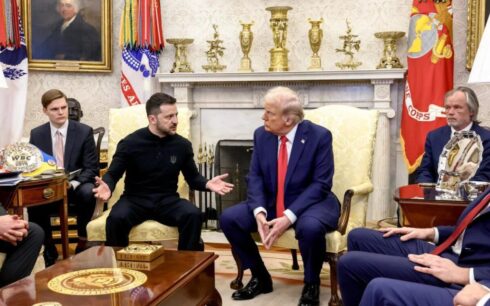President Joe Biden landed in France on Wednesday to commemorate the 80th anniversary of D-Day, a visit designed to underscore his commitment to U.S. allies in Europe and contrast his vision of democracy with that of his 2024 political opponent, Donald Trump.
Biden’s five-day stay in France includes attending D-Day celebrations in Normandy, where U.S. and allied forces launched a crucial offensive against Nazi Germany in World War II. He is also set to deliver a significant speech and engage in a formal state visit with President Emmanuel Macron.
While in Normandy, Biden will meet with Ukrainian President Volodymyr Zelensky to discuss the ongoing war effort against Russian forces, according to White House National Security Adviser Jake Sullivan, who spoke to reporters aboard Air Force One.
Biden’s speeches in Normandy—scheduled for Thursday at the formal anniversary ceremony and Friday at the famed Pointe du Hoc cliffs—will highlight the dangers of isolationism and the importance of standing up to dictators. Sullivan stated that Biden will draw a historical line from World War II through the Cold War and the creation of NATO to today’s challenges, noting, “We face once again war in Europe, where NATO has rallied to defend freedom and sovereignty.”
In a poignant moment, Biden will meet with veterans who participated in the D-Day invasion.
White House National Security Spokesperson John Kirby mentioned that discussions between Biden and Macron will include the potential use of approximately $300 billion in frozen Russian assets to aid Ukraine.
Biden, a Democrat running for re-election in November, has made the preservation and strengthening of U.S. democracy a central theme of his campaign, particularly following Trump’s contentious tenure. Trump, a Republican, has refused to accept the results of the 2020 election, leading to the January 6, 2021, attack on the U.S. Capitol by his supporters. Trump has pledged to pursue political opponents, deport immigrants, and punish whistleblowers if elected again.
Trump’s stance on NATO—threatening to withdraw U.S. support if allies do not increase defense spending—has raised concerns about the future of the alliance under his potential leadership.
Biden’s pro-democracy message may face complications due to his strong support for Israeli Prime Minister Benjamin Netanyahu in the conflict with Hamas in Gaza. The war, which erupted after a Hamas attack in October last year, has resulted in significant Palestinian casualties. The International Criminal Court has charged Netanyahu with war crimes, and some international allies and left-leaning U.S. voters are calling for Biden to halt military aid to Israel, a stance that could impact his support in key states like Michigan.
The D-Day commemorations occur against the backdrop of the ongoing war in Ukraine, now in its second year. At a political fundraiser prior to his trip, Biden described the D-Day invasion as “one of the most important moments in the history of defense of freedom and democracy” and emphasized that the sacrifices made on that day must not be forgotten.
“Democracy is literally on the ballot this year. The future of democracy and freedom is at stake. We have brave soldiers who gave their lives on the beaches of Normandy who did their part,” Biden told donors in Connecticut on Monday.





